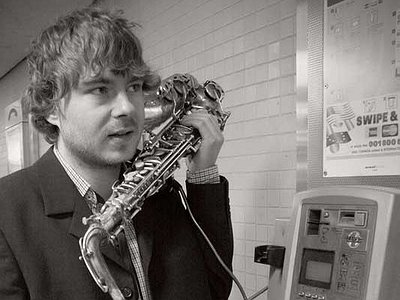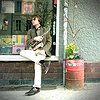Part 2
Tell me about your instrument, please. How would you describe the relationship with it? What are its most important qualities and how do they influence the musical results – and possibly even your own performance?
I play a Selmer Super Balanced Action from 1951 with no technical adjustments. So all the microtones are just produced by fingerings. I have played my instrument for almost ten years now. I like it, but I also know there are much better instruments around. I could see myself switching to a different saxophone, while of course keeping the old one. Selmer made great saxophones back then, but since they are handmade the quality varies. So I think I have one of the not so great horns, but I don't want to complain. An instrument is just a tool. It is replaceable. But replacing one needs practice and it also influences the outcome of my playing. Basically it just needs to “work”. It is great though if it has some character, some edges, like the old saxophones do (newer models tend to sound the same, they are more precise but lack “character”). It is hard to describe, one must experience it, I think.
Derek Bailey defined improvising as the search for material which is endlessly transformable. Regardless of whether or not you agree with his perspective, what kind of materials have turned to be particularly transformable and stimulating for you?
I think Derek Bailey has a point here. But any material can be endlessly transformable or be the starting point for something endlessly transformable. Just because many mathematical possibilities exist it doesn't mean that they are emotionally connected to the musician. This is what counts in the end. There are so many things that can be played and concepts that can be found. During my studies I was presented with so many concepts that after a while one doesn't know what to do with them. This was great, don't get me wrong but sometimes this can be distracting because one is not given time to reflect. I also think that it is impossible to set up a jazz department which serves the needs of all students.
The material that turned out to be transformable and stimulating is microtonality of course. There are just endless possibilities of scales, harmonies and sounds, so I have never used a tone system twice so far. There are just so many that I don't see myself applying techniques of the 12 tone system to them. I don't pratise permutations in microtonality. I try to get rid of all the things I don't like, and to just play what I like. I want to be 100% in sync with everything I play. I want people to believe every single note I play. This is a constant process.
I recall a jam session with amateur musicians I played in New York. We were all sitting in a circle, playing the blues for several hours. Mostly blacks, some white people. We had such a great time. Sitting next to me was an old lady in a wheelchair. She did percussion with some shakers and singing along. She was not formally trained and really felt the blues. When it was my turn to take a solo in that split second I felt that everything I seemed to know about the blues would just be silly to play. I couldn't get away with the things that would be accepted at other jam sessions. Every tone I produced had such a deep meaning to them and everyone was listening attentively. I did not do badly, they called me again to sit in for another session but it made me rethink my whole perspective on music. This session is the benchmark for everything I have played since.
So all in all I can say, that the most important thing for me is not the search of endless transformability but more about the endless quest of reflecting oneself and defining one's own language.
How is playing live in front of an audience and in the studio connected? What do you achieve and draw from each experience personally? How do you see the relationship between improvisation and composition in this regard?
For me there is not a great difference between playing in the studio and playing live. There are more possibilities to edit in the studio if necessary but my goal is to make everything sound great right away, even when practising. Blowing into my saxophone is a sacred process for me. I don't want to waste any note. This means that I play much less than I did in previous years.
When playing in front of an audience the music is different. The band interacts with the audience and of course you try out more things, especially with smaller club gigs. My approach to playing is always the same.
Composition and improvisation are the same for me. They are two sides of the same coin. I believe the saying that improvisation is composition in real time and composition is improvisation in slow time is true. Whenever I play, I try to keep the overall structure in mind. The shape of the solo, of the song and of the concert. Structure and shape are the most essential part of composition to me. So these two thing really go hand in hand.
Could you take us through a day in your life, from a possible morning routine through to your work? Do you have a fixed schedule? How do music and other aspects of your life feed back into each other - do you separate them or instead try to make them blend seamlessly?
I get up in the morning and take care of my baby daughter first while my girlfriend is away studying Alexander Technique. Then I go into my practice room and play. I do some office work before my first student comes. After I am done teaching I play with my daughter. In the evening I have time for myself. Usually the time between 9pm and 2am is when I am able to work most efficiently. The good thing is that I don't need much sleep. Days are too short of course but I am able to keep up with my work. I am a workaholic and I have learnt that when I am on my own I don't have a stop mechanism. I have realised that when I conserve my strength I am more efficient in the long run. What can I say? My girlfriend and my daughter keep me in good shape!
Music and life go hand in hand. The piano is in use a lot, my girlfriend is a singer. We sing a lot, play and listen to music. Music is like a room mate living with us.
Could you take me through the process of improvisation on the basis of one of your performances that's particularly dear to you, please? Where did the ideas come from, how were they transformed in your mind, what did you start with and how do you refine these beginnings into the finished work of art?
Since I have to individually detune each key of the keyboard when playing, they may not produce the expected notes. So the first step for guiding a pianist into improvisation is communicating certain chords and melodies which I find interesting and appealing on the microtonal scale. This initiates an improvisation which reveals new chords and sounds. But the centre of gravity remains within the borders of the scales and chords I have chosen. The way the other instruments deal with them and the overall shape of music and performance then inevitably leads to the finished work of art.








